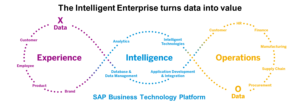Triggered by the global pandemic, we’ve heard a lot recently about the need for organisations to be resilient; to be able to “bounce back” from the shock and revert to a pre-crisis state. But this begs a crucial question – bounce back to what? Do we really want to maintain the status quo?
Whilst the future is uncertain – especially economic recovery – you can take it as read that our world will be different. There is no going back. The Covid-19 pandemic, the social justice movement, the activism of ESG shareholders, Brexit, climate change, the expectations of Gen Z and the rise of AI demand that organisations chart a different course. We are at an inflection point where resilience, whilst necessary, is insufficient. Organisations also need the strategic suppleness to create, innovate and adapt for a very different, better, world.
Time For Change On A Grand Scale
Much, perhaps most, of human progress has been charted by people willing to take risks, to confront uncertainty, push boundaries, and in many cases, to face derision and opposition from society – especially those who cling to the familiar. The list of changemakers is long and covers every field of human endeavour; Socrates, Alexander the Great, Galileo, Luther, Gandhi, Shackleton, Martin Luther King, Edmund Hilary, William Wilberforce, Karl Marx, the suffragettes, Einstein, Madame Curie, Mandela, Florence Nightingale, Jan Smuts, Emily Hobhouse, Picasso, the punk movement, Steve Jobs. These are people who through their intelligence, curiosity, leadership qualities and drive have catalysed change, often on a grand scale.
You may disagree with some of my choices and doubtless have your own names you’d add. That’s okay because the point is that today and tomorrow every one of us is going to be adventuring into new territory as a result of the current upheaval. Every one of us will need to be more adaptable and inventive.
Black Swans Or Blindness?
People are loosely referring to the Coronavirus pandemic as a Black Swan event. It wasn’t; it was foreshadowed by plagues and pandemics throughout history, including recent outbreaks of SARS and Ebola. The UK Government published its Influenza Pandemic Preparedness Strategy as far back as 2011. Nonetheless, the world was unprepared. So, what was different this time and how do we ensure we’re better able to face future challenges?
The world’s population is 5.2 times larger today than it was when the Spanish influenza pandemic struck in 1918, which infected about a third of the global population and killing somewhere between 17.4 to 50 million people over two years. So, we simply have more people, often living in poverty or in cramped, unhygienic conditions who can become vectors for viruses. The world is completely connected – trade and travel carry people, products and viruses around the globe in a matter of hours but, despite the internet, the right data is not readily available. It is therefore difficult to understand what is actually happening and there is less time to analyse, plan and act. This holds true for both governments and health authorities as well as corporate supply chains. Allied to all this our activities as consumers have led us into the existential crisis of climate change. Lastly, human nature being what it is, perhaps we are all too blasé, falling prey to the concept of technological determinism and the idea that we are somehow outside of and able to tame nature with our technologies. There is plenty to fix and it is obvious we need a more intelligent and collaborative way of conducting life and business to secure a better life for the generations ahead.
Adaptability As The Hallmark Of Intelligence
Nobody can tell you accurately how the future will play out; what shape the recovery will be, what future outbreaks will look like and whether a vaccine will be found, how AI will reshape work and society or whether we can arrest climate change. But there are some things we know and that we can predict and prepare for if we have the right capabilities in place. At SAP we are focused on helping companies to become Intelligent Enterprises – able not just to contend with whatever comes their way but to actively shape a better, purpose-driven future by leveraging digital technologies.
Intelligence – Learning To Adapt
David G. Myers, Professor of Psychology at Hope College, Michigan, defines human intelligence as “the ability to learn from experience, anticipate problems, and use knowledge to adapt to new situations.”
This definition is a useful analogy for organisations too – especially as AI adoption accelerates. Let’s unpack it to see how it applies to business.
Experiences As Data
All the activities that an organisation performs and all the outcomes it creates, are reflected in its data; every transaction, customer interaction, product modification, hiring and firing policy decision and much, much more is stored somewhere. Be it in an ERP or CRM database, a budgeting spreadsheet or planning tool, a weblog, a CCTV DVD, an MES historian, an enterprise data warehouse or a data lake – organisations are awash with data, but it’s often fragmented and inaccessible – some on-premise with increasing amounts in the cloud. That problem is only going to grow as we deploy more sensors with the internet of things and gather more personal human experience data from citizens, consumers and employees. The challenge is how to manage, make sense of and extract value from this data when it’s fragmented and moving at high speed.
Learning With Machines – The Key To Adapting
The manifold benefits of digital transformation rest on our ability to quickly gain insights into how our enterprise is performing, so that we can optimise and innovate faster than competitors while using all resources more efficiently. The only way we can turn vast volumes of data into value is with AI in its various guises and especially machine learning. But this can only happen if we bring coherence and integrity to the data. Once our data is consistent and controlled, we can then employ techniques like machine learning to spot patterns, correlations and outliers (such as fraud or hacking) and thus begin to make the organisation more efficient and productive and far more responsive to its environment.
Using Knowledge To Adapt
Humans are uniquely qualified to deal with complex problems, to be creative and innovative and to build collaborative relationships – the very things we need in order to create the experiences that fuel the sustainable businesses of tomorrow. The problem is that, all too often, employees don’t get to exercise these qualities because they are trapped in boring, mundane, repetitive work and ill-equipped with the insights needed to anticipate the future.
Now, however, with our ability to manage data of any sort, from anywhere and apply AI techniques to it, we can begin to automate the routine work and unleash human talent. We can augment creative minds with powerful analytical tools to deliver “aha” insights that fuel innovation; humans and machines working together to create a better future. Now, we can go beyond simply adapting to new situations to creating them through data-driven disruption. This is the hallmark of the Intelligent Enterprise – one that can accelerate the Darwinian process of business evolution.
The Intelligent, Adaptive Enterprise Requires A Digital Business Platform
The strategic and tactical promises of digital transformation can only be realised by turning data into value. Easier said than done given some of the challenges outlined above, but a challenge that SAP is addressing with customers around the world through the SAP Business Technology Platform. For nearly half a century SAP has enabled its customers to navigate significant inflection points and has amassed unique industry and business process knowledge that we’re bringing to our technologies and tools in the form of a unified Business Technology Platform. In a coherent, open architecture the Business Technology Platform brings together four crucial capabilities:
- Databases and Data Management – to optimise the flow, storage and use of data while ensuring compliance so better decisions can be made faster.
- Application Development and Integration Management – so that companies can extend, innovate and integrate at scale as they pursue a competitive advantage through digital transformation.
- Analytics – to deliver deep insights and democratise data through simpler access to critical information to drive better business outcomes and accelerate growth.
- Intelligent Technologies – such as artificial intelligence (AI), blockchain and the internet of things to optimise and automate business processes and resources and accelerate innovation in any area of a business.

The underlying technology has always been pivotal to the success of previous generations of SAP applications. Now, as we contemplate an ever more dynamic future for businesses as they serve humanity and conserve the planet, it becomes even more important.
With the SAP Business Technology Platform, companies as diverse as BASF, Delivery Hero, PayPal, Villeroy & Boch Group and Döhler GmbH are weaving advanced technologies into their business processes while SAP takes care of the technicalities by unifying data and processes, technology, functionalities, cloud and on-premise deployments and the user experience. This saves unnecessary data movement between different technology stacks, reduces risks and effort and, overall, reduces customers’ total cost of ownership (TCO) as they drive transformation.
The SAP Business Technology Platform is the fastest way to get from data to business value and achieve the strategic suppleness needed to succeed in the next normal.



